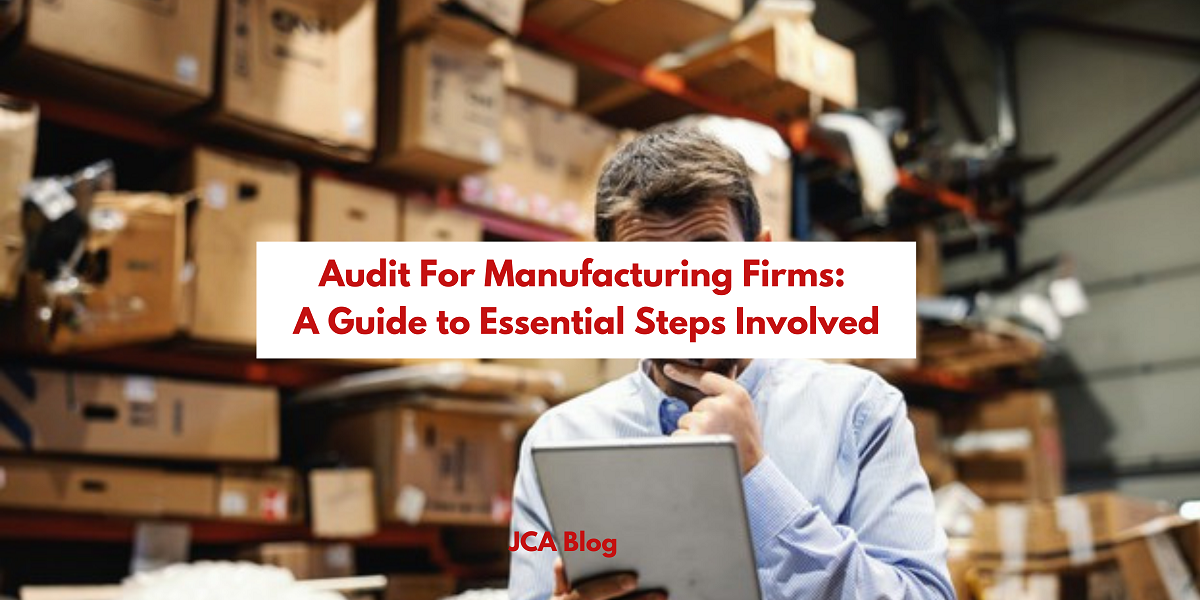
Audit For Manufacturing Firms: A Guide to Essential Steps Involved
Unlike most other forms of businesses, a manufacturing company has to thwart multiple challenges. The manufacturing sector is vulnerable to the danger of flouting audit standards as the industry is marked by unique features that may appear to be complex during the audit. Most manufacturing companies require huge amounts of capital investment and operating costs that increase the risks. Manufacturing businesses are also vulnerable to risks such as geopolitical issues, labour challenges, technological and logistic challenges etc.
Considering the diversity of the risks, a solid audit performed by the best audit firms in Dubai helps the business owners in making the internal controls of the organisation more robust. The audit process is nearly uniform for all types of businesses, but the requirement for additional procedures warrants increased attention. Knowing about procedures such as inventory observation, price testing, control testing, and Inventory reserve testing etc. will help you prepare for the audit.
Read on to know detailed steps:
1. Inventory Observation
It is standard procedure for the auditor to physically observe the company’s inventory count procedures. During the initial stage of the audit process, the UAE auditors will perform their own independent tests of the physical count of your company’s inventory. Inventory observation is required to counter the accounting frauds arising as a result of the falsification of inventory records.
The auditor employs mainly two techniques while conducting inventory observation of your manufacturing business in Dubai: ‘floor-to-sheet’ and sheet-to-floor methods. In the floor-to-sheet technique, the auditor selects items from the warehouse to check whether they are enlisted in the record. Then he or she proceeds to select items from the record to check whether they are present in the warehouse, which is called the ‘sheet-to-floor’ technique. The ‘sheet-to-floor’ technique tests the existence of the inventory.
2. Price Testing
After testing the quantity of the inventory with the inventory observation, the auditor will proceed to test the cost of the inventory. As per the generally accepted accounting standards, the inventory is held in the financial statements at the lower of cost or market price. At this stage, the auditor verifies the cost you paid for the materials, labour and overhead etc.
The auditor performs price testing by selecting items from your company’s inventory on a test basis and verifies that the inventory cost is accurately recorded in the financial statements. To carry out price testing, the UAE auditor will analyse original documentation such as invoices and time cards. Consultation with the best audit firms in Dubai will help you comply with the accepted accounting standards while preparing for the inventory audit.
3. Inventory Reserve Testing
A large number of manufacturing businesses may be holding inventory that may perish or become obsolete. This case is especially applicable to food manufacturers that hold perishable inventory. The auditors will conduct inventory reserve testing to ensure that the market value of the inventory doesn’t exceed the cost verified during price testing.
Auditors will also assess the risk of obsolete inventory while testing internal controls. The auditors might have counted spoiled food or obsolete boxes during inventory observation, and this may force them to perform aggressive testing during the inventory reserve testing. For a stress-free inventory audit, the manufacturers may hire an auditor from the best audit firms in Dubai, UAE.
4. Result Analysis
After conducting extensive testing on quantity, price of the inventory, the auditor will start analysing the results. The analysis is a key moment in the audit process where the auditors in Dubai can identify whether there are anomalies in the company’s financial statements or losses suffered by your company.
Sometimes the big companies across the world employ multiple auditors and let each of the auditors to analyse and compare the results. It may be an effective strategy, but availing the services of best audit firms in Dubai is a much better solution compared to hiring multiple auditors. When the analysis is completed, the auditor submits the report to the management of your company. The report contains recommendations that will help you improve the company’s financial management.
Related: Procedure Followed by Auditors for Inventory Audit in UAE
What Manufacturing Companies Should do to Ease the Audit Process?
The manufacturing industry is beset with a set of audit challenges due to the huge sums of investments and operating costs involved. The presence of perishable inventory, costs etc. only adds to the complexity of the audit process. Effectively tackling these challenges is vital for companies to ensure compliance with generally accepted accounting standards. To avoid potential fraud or scandals, it is highly advisable to avail the services of the reputed auditors in Dubai, such as Jitendra Chartered Accountants (JCA).
JCA’s experience and industry knowledge help the manufacturing companies to ensure compliance with the UAE laws and accounting standards, including the IFRS. JCA has a team of highly qualified Chartered Accountants who have set a benchmark in the market by providing the best audit services in Dubai.


